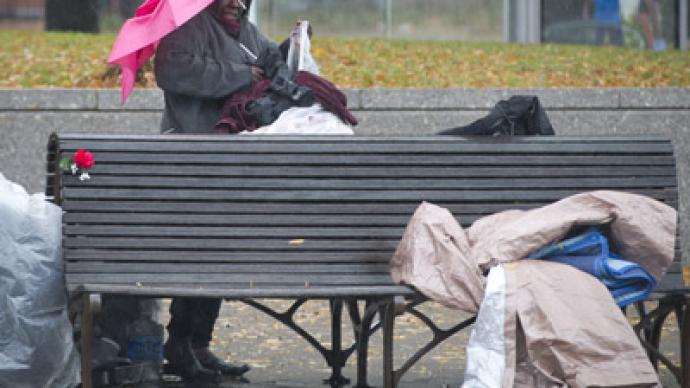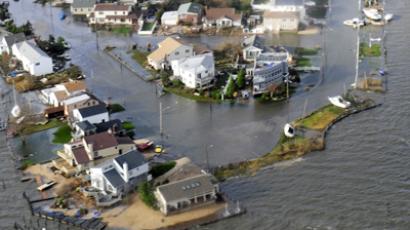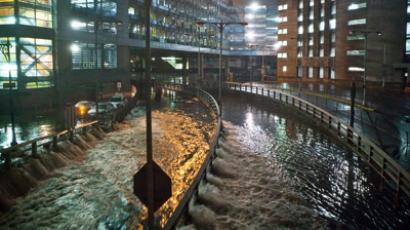Nowhere to run: Homeless battle elements as Superstorm Sandy hits

Hours after superstorm Sandy battered the eastern coast of the US, residents hope to repair the damage and move on. But as the media focuses on power outages and damaged apartments, many have forgotten about the area’s silent citizens – the homeless.
As residents fled to hotels and the homes of friends and relatives in preparation for the storm, the homeless were left with few options – except to hope for the best.The lucky ones were able to claim a spot in one of the 46,631 beds scattered throughout New York’s various homeless shelters. But many others were left out in the cold.Lacking enough beds to house all those in needs, many shelters made exceptions, allowing their buildings to go over capacity for the night. But although the efforts helped many in need, there still wasn’t room for everyone.The Department of Homeless Services’ spokesperson, Heather Janik, told the New York Observer that outreach teams have been out and about with an “extremely enhanced” presence since Sunday morning.“In partnership with the NYPD’s homeless outreach unit, the DHS’s outreach teams have managed to bring 175 people inside,” she said. Whilst those efforts have been lauded, reports online suggest that many homeless were left on the streets, bunked in doorways, as the storm approached on Monday. With no promise of assistance or a bed, New York’s homeless community did whatever they could to survive the storm. For one person, that meant traveling to Newark Liberty International Airport.Speaking to New Jersey News from a covered entrance to Terminal B, 60-year-old Dorothy Howe said, “This is the safest place a homeless person could be right now.” Howe took a bus from downtown Newark to the airport on Sunday afternoon, before New Jersey Transit halted all bus, train, and light rail services.“I didn’t know where to go,” she said.
But the lack of beds isn’t the only thing stopping many of the city’s homeless from seeking refuge in a shelter. According to an article by freelance journalist, Julia Reinhart, the system has become a maze of complicated rules which make many of the city’s most needy ineligible for a bed. James, a forty-three year old homeless man, told the journalist that once a person has been in the system for 18 months, he can’t return for at least one year. “I can’t go back to the shelter system for another two months," he said.James also stressed he couldn’t go to an emergency shelter, because those were aimed at people made homeless by the storm – not those who are permanently without a home.“They don’t want us there. These shelters are for the good folks, the families that get evacuated. There is no room in there for me,” he said.However, religious and non-profit organizations throughout the east coast did their best to make up for the shortcomings of local governments. Catholic Charities of the Archdiocese of Washington, D.C. used twitter to spread news of their goodwill, encouraging readers to “please call if you see someone on the street who needs to get in out of the storm.”Shepherd’s Table, a resource center for homeless people in Silver Spring, Maryland, didn’t let the storm squash their spirits on Monday night. Employees and volunteers turned up – despite heavy winds and flood warnings – to serve meals to the needy. “We serve a meal seven nights a week…we’ve never, ever missed a meal,” Executive Director Jacki Coyle, told the Colesville Patch. But the kindness didn’t stop there – the organization opened up the building to those in need.“Any person who’s without a home and needs a place to stay can be here tonight,” Coyle said.














